|

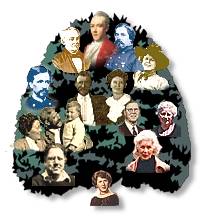
The Woolsey Branch
UPDATED 1 May 2016 |
|


The Woolsey Branch
UPDATED 1 May 2016 |
|
| |
|
His parents were Presbyterians; and immediately after graduation he began the study of theology and appears to have continued it at home, though the Jamaica dissenters were then without a pastor. By the summer of 1710 he had married Abigail Taylor, the only child of John and Mary (Whitehead) Taylor, of Oyster bay, Long Island. Her father was long since dead, and her mother was now the widow of the Rev. William Urquhart, the Episcopal missionary to Jamaica from 1704 to 1709. In 1711 we hear of Mr. Woolsey as preaching for a single Sunday to the Presbyterians of Hopewell, New Jersey (where his elder brother resided), occupying for the purpose the Episcopal church and so causing a great scandal. In 1714 he was invited to become a colleague-pastor of the church in Huntington, Long Island, but declined the invitation. In January, 1714-15, he describes himself as "of Dosoris," an estate nearly two miles north of the village of Glen Cove, where his wife's father had owned much land, and where he himself eventually settled on a farm containing upwards of a thousand acres. The name Dosoris has been variously interpreted, as an Indian name, or as a Latin designation given by Mr. Woolsey (dos oris or dos uxoris); it is said to have been used, however, before his time. He was ordained and installed in Southhold, Long Island, about the middle of July, 1720, succeeding the Rev. Joshua Hobart (Harv. Coll. 1630), who died February 28, 1716-17. In 1736 he resigned his pastorate, that he might return to Dosoris and cultivate the estate left to his wife by her father. Here he lived for the rest of his days, preaching as opportunity offered, and during much of the time regularly in his own house. He died at Dosoris, of a disease of the kidneys, August 15, 1756, in his 69th year. His tombstone commemorates him as one "who, in the United Character of the Gentleman, the Christian, the Divine, shone with distinguished Lustre and adorn'd every Station of public and private Life with Dignity and Usefulness. Early devoted to the Work of the Gospel Ministry, endowed with the Gifts of Nature and Grace, he Employ'd His Superior talents in the Service of his Divine Master with Fidelity and Zeal." A notice in the New York Mercury, soon after his death, has this just tribute of praise:- Oysterbay, on Long-Island, August 20, 1756. Last Lord's Day Morning, departed this Life in the 69th year of his Age, and on Tuesday was decently interred, the Revd. Mr. Benjamin Woolsey, of this Place. He was a Gentleman whose intellectual Powers were much above the common Level. These improved by a liberal Education, and early sanctified by divine Grace, eminently furnished him for the Service of God and his Generation, in the sacred Office of the Gospel Ministry; to which he accordingly devoted himself, and was ordained a Pastor of the first church in Southhold.
| |
|
| |
|
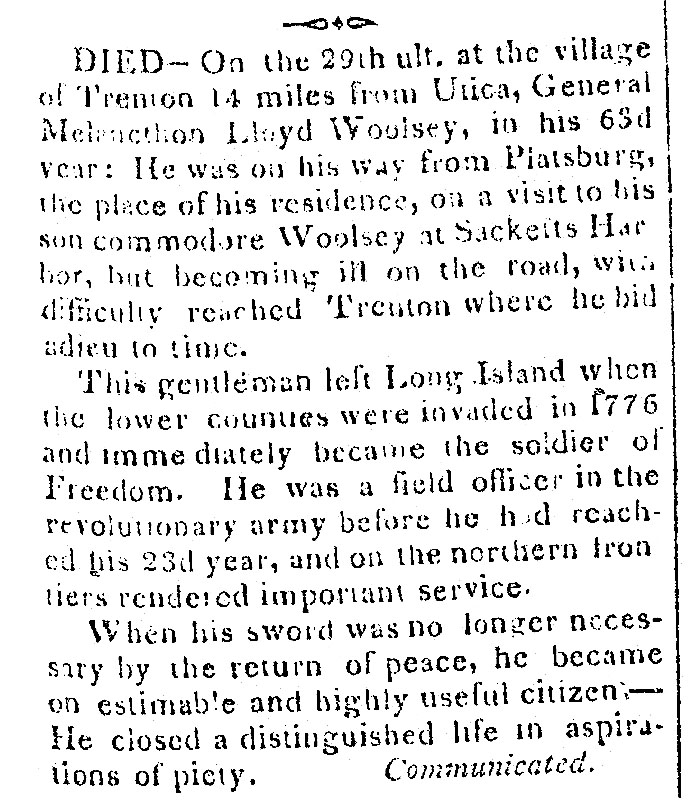
| |
|
| |
|
From 1808, he served on the Great Lakes, constructing the brig Oneida, whose guns he used to force a superior British force to withdraw in 1812 at Sackett's Harbor. In 1813 Woolsey was promoted to Commander, while still in charge of the Oneida. He was subsequently given command of a new and larger schooner, the Sylph. In 1814 Woolsey was given command of the Jones, a brig of twenty-two guns. After the war, Woolsey continued in Sacketts Harbor until he was given command of the Constellation frigate, his last service afloat. He was in charge of the Pensacola Naval Yard for two years at his death in 1838.
In 1817 Woolsey married Susan Cornelia Tredwell, the daughter of Dr. James Tredwell, with whom he had seven children. Most of their
children were named for his aunts and uncles on his mother Alida's side.
One son was named for Judge Richard Ray Lansing, who married
two of Woolsey's first cousins.

| |
|
| |
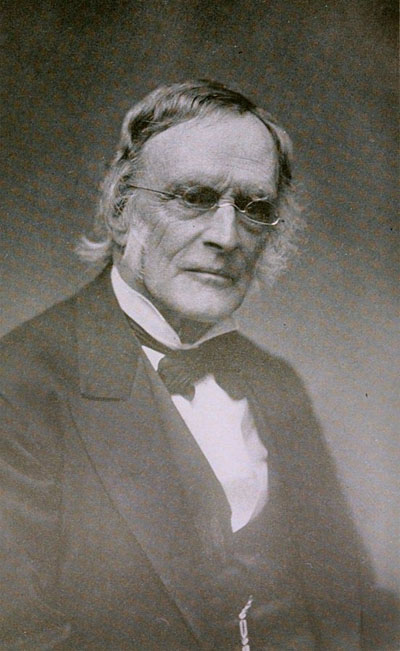 Theodore Dwight Woolsey, the greatgrandson of Rev. Benjamin Woolsey,was born October 31, 1801 in New York City.
Like Rev. Woolsey, he attended Yale College, continuing his studies with a year in law in Philadelphia, and
two years in theology at Princeton. He later studied Greek in Germany. He was a professor of Greek at Yale
from 1831 to 1846, then becoming president of Yale until he resigned in 1871.
Theodore Dwight Woolsey, the greatgrandson of Rev. Benjamin Woolsey,was born October 31, 1801 in New York City.
Like Rev. Woolsey, he attended Yale College, continuing his studies with a year in law in Philadelphia, and
two years in theology at Princeton. He later studied Greek in Germany. He was a professor of Greek at Yale
from 1831 to 1846, then becoming president of Yale until he resigned in 1871.
Woolsey graduated as head of his class at Yale in 1820, and in 1831 he was appointed professor of Greek there. Elected president of Yale in 1846, Woolsey improved scholarly standards and expanded the university. Under his leadership the scientific school was founded, the first American Ph.D. was awarded (1861), the first college school of fine arts was established, the law and divinity schools were rejuvenated,
He was graduated at Yale, A.B., 1820, A.M., 1823, studied law in Philadelphia, 1820-21, and theology at Princeton, 1821-23. He was a tutor at Yale, 1823-25; was licensed to preach in 1825, and studied abroad, 1827-30. He was married, Sept. 5, 1833, to Elizabeth Martha, daughter of Josiah and Abigail (Breese) Salisbary of Boston, Mass., and secondly, Sept. 6, 1854, to Sarah Sears, daughter of Gilman and Mary (Briggs) Prichard. He was professor of Greek language and literature at Yale, 1831-61, and was president of Yale Oct. 21, 1846, to Oct. 11, 1871, when he resigned. He was lecturer on international law, 1873-77, and was a fellow of Yale, 1871-85. He was a member of the American company of revisers of the New Testament; was president of the Oriental society, and a regent of the Smithsonian Institution. He received from Wesleyan university the honorary degree of LL.D. in 1845, and from Harvard, that of D.D. in 1847, and LL.D. in 1886. The name, Theodore D. Woolsey (1801-1889), in "Class C, Educators," received 21 votes for a place in the Hall of Fame for Great Americans, October, 1800. Besides editing many Greek dramas, he wrote: Introduction to the Study of International Law (1860); Essays on Divorce and Divorce Legislation (1869); Religion of the Present and of the Future (1871); Political Science (2 vols., 1877) Communism and Socialism in their History and Theory (1880), and Helpful Thoughts for Young Men (1882).
He died in New Haven, Conn., July 1, 1889.

| |
|
| |
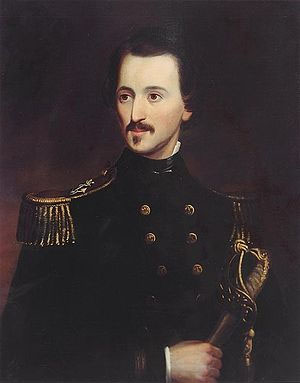 Melancthon Brooks Woolsey, the son of Captain Melancthon Taylor Woolsey, USN, was born at Sacketts Harbor, New York, on 11 August 1817. His Naval service began as a Midshipman in September 1832 and he rose in rank to Lieutenant by 1847. In September 1855, Lt. Woolsey was placed on the reserve list, but was recalled to active service after the Civil War began in 1861. From late in that year until mid-1862 he commanded the gunboat Ellen during active operations along the Confederate coast from South Carolina to Florida. In July 1862 Commander Woolsey took command of the sloop of war Vandalia and in early 1863 became Commanding Officer of the steam gunboat Princess Royal, in which he served in the Gulf of Mexico until the war ended in 1865.
Melancthon Brooks Woolsey, the son of Captain Melancthon Taylor Woolsey, USN, was born at Sacketts Harbor, New York, on 11 August 1817. His Naval service began as a Midshipman in September 1832 and he rose in rank to Lieutenant by 1847. In September 1855, Lt. Woolsey was placed on the reserve list, but was recalled to active service after the Civil War began in 1861. From late in that year until mid-1862 he commanded the gunboat Ellen during active operations along the Confederate coast from South Carolina to Florida. In July 1862 Commander Woolsey took command of the sloop of war Vandalia and in early 1863 became Commanding Officer of the steam gunboat Princess Royal, in which he served in the Gulf of Mexico until the war ended in 1865.
Captain Woolsey commanded the steam sloop Pawnee and the much larger Guerriere in the south Atlantic during the last years of the decade. Promoted to Commodore in 1871, he was in charge of the South Atlantic Station and, in 1873-1874, of the Pensacola Navy Yard, Florida. He died in of yellow fever at Pensacola on 2 October 1874.
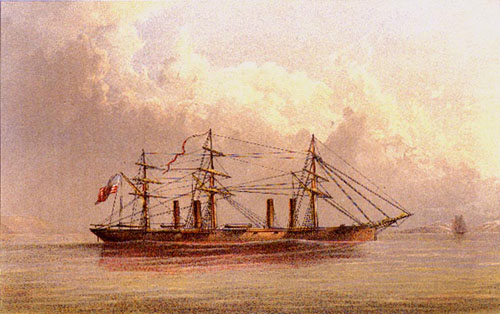 Colored lithograph, after a drawing by Captain Melancthon B. Woolsey, USN
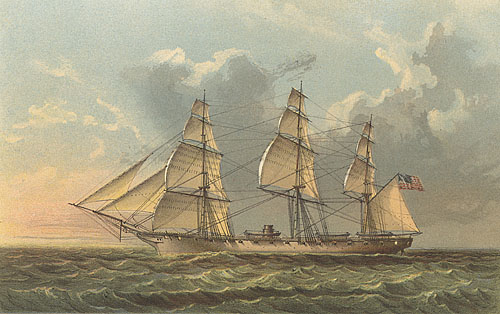
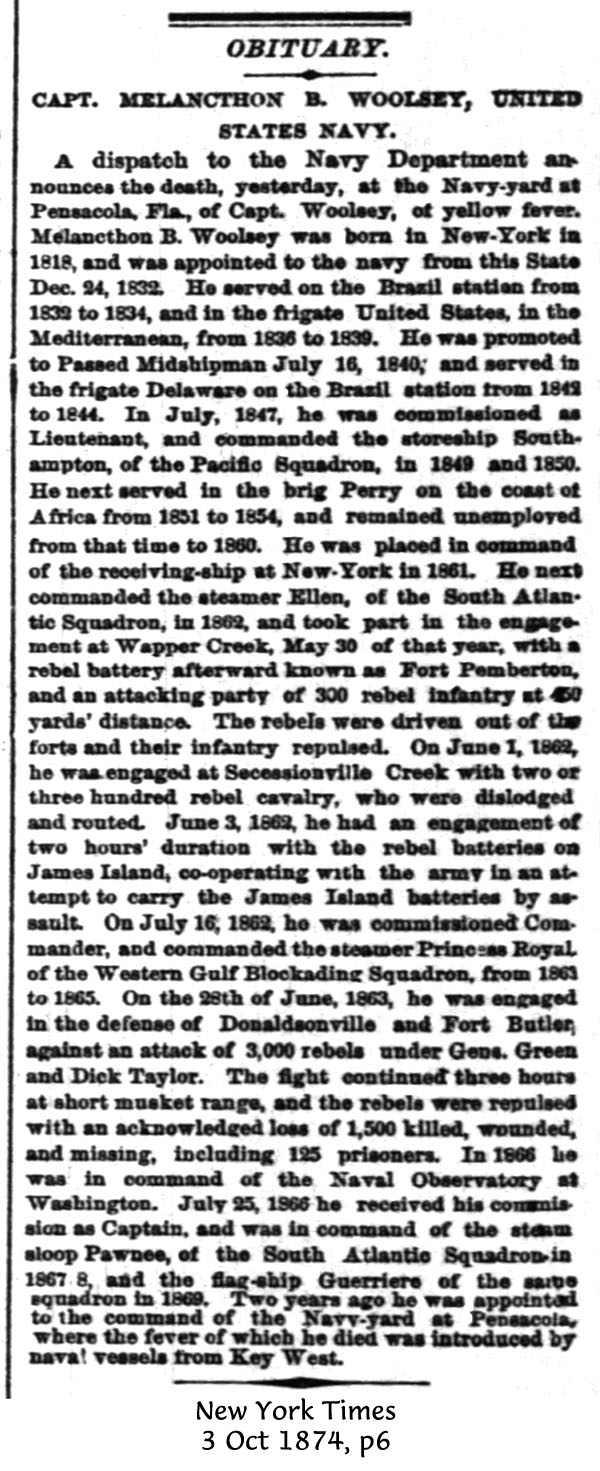
| |
|
| |
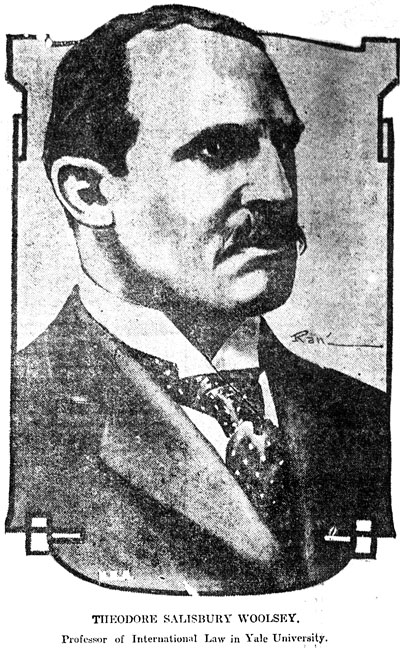 The Brooklyn Daily, 26 Apr 1929, p8
The Brooklyn Daily, 26 Apr 1929, p8Perhaps the greatest academic authority on the old international law which the World War did not succeed in "junking," passes in the death of Dr. Theordore Salisbury Woolsey, who was a Yale professor for thirty-two years, making this subject his speciality, as it had been the specialty in later life of his father, Theodore Dwight Woolsey, president of Yale from 1846 to 1871. The father was a nephew of Timothy Dwight, president of Yale from 1795 to his death in 1811. Timothy Dwight had been a regimental chaplain in the Revolutionary war. Coming of such stock, graduated at Yale in 1872, and from the Law School in 1876, and then maturing his education by a year abroad, Theodore Salisbury Woolsey had a perfect equipment for his life work. As a publicist he contributed much toward the broadening of the public understanding of the laws of nations. He chose to become a professor emeritus in 1911, and to lead a life of dignified retirement. But in 1914 he consented to become president of the New Haven Park Board, and held the place until his death, accomplishing much for the embellishment of the city he loved.
Such a career is inspiring to all thinking Americans. In our civilization it is a rare career. In the older countries it is not so unusual. Rangeful thought and exact
scholarship merit more of appreciation in the United States of America.

|

 Copyright © 1997, Mary S. Van Deusen
Copyright © 1997, Mary S. Van Deusen